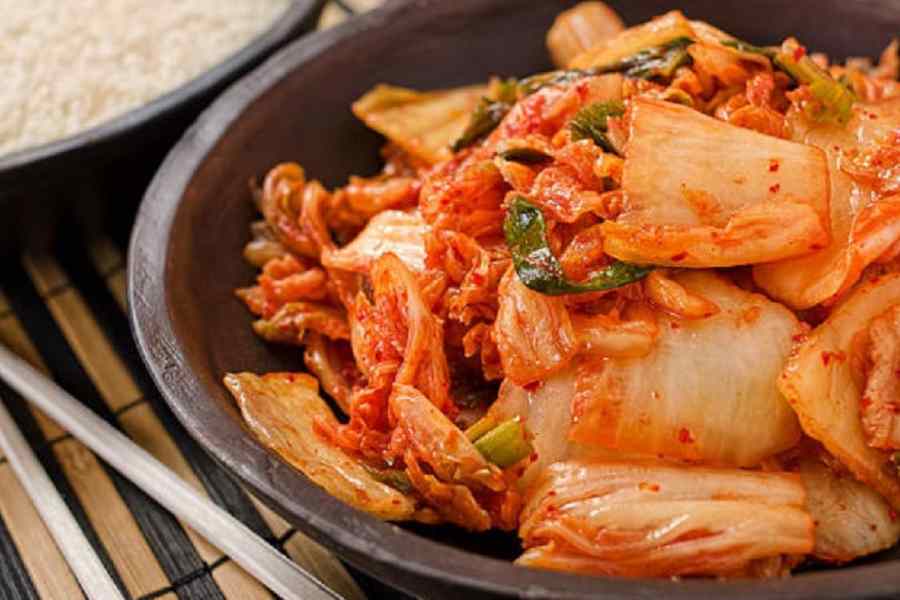Taste the bias
Sir — After the strong imprint of Korean dramas and K-pop music on Indians, food seems to be South Korea’s next big cultural export to India. Such is its popularity that the Korean food, kimchi — or fermented vegetables in spices — is now competing in Indian kitchens with potato curries and mirchi ka achaar as an accompaniment to parathas. There are many health benefits of kimchi and Indians are lapping it up. Yet, these very tongues that do not tire singing praises of this fermented delicacy have for years refused to taste sinki, ziang sang, anishi, to name just a few fermented vegetables that have long been a part of cuisines from Northeast India.
Shreya Chatterjee, Calcutta
Nation ablaze
Sir — It is heartening that the Supreme Court of Bangladesh finally decided to scrap several quotas in government jobs (“Calm down”, July 23). Following the decision of a high court in Bangladesh to reserve seats in government jobs for the descendants of freedom fighters, violent clashes between student protestors and law enforcement agencies resulted in several deaths and a country-wide internet shutdown.
The situation had arisen as a result of the Sheikh Hasina Wajed-led government’s failure to anticipate the scale of the unrest. The police in Bangladesh had been granted ‘shoot-on-sight’ orders and a nationwide curfew was imposed. Normalcy could have been restored earlier had the government engaged in a meaningful discussion with all the stakeholders.
Jayanta Datta, Hooghly
Sir — The situation in Bangladesh was dire. Students and netizens were protesting against the controversial quota system and the death of several protestors. The government should have prevented the protest from taking a violent turn. Steep inflation and unemployment prompted the youth to revolt.
Dimple Wadhawan, Kanpur
Sir — The recent student protest in Bangladesh was a matter of concern for India as well. Reservations have been used to uplift marginalised communities and create social equality. But maintaining a quota system that was introduced for the benefit of the freedom fighters in the 1971 Liberation War seems unnecessary in the 21st century. Countries which have reservations must periodically scrutinise the same for relevance.
Kirti Wadhawan, Kanpur
Sir — The Indian High Commission in Dhaka issued an advisory regarding the unrest in Bangladesh where at least 100 people have been killed during protests against quotas (“India wary of diplomatic cost of Bangla stir”, July 20). Indians residing in Bangladesh were advised to stay indoors and avoid non-essential travel. Communications and internet connections were widely disrupted. The worsening situation in Bangladesh had compelled many Indian students to return home by hook or by crook.
S.S. Paul, Nadia
Sir — Even as the anti-quota protests come to an end in Bangladesh, a similar threat perhaps looms over India, which, too, has quotas for several segments of the population. The Bangladeshi government provides quotas to certain groups, including the descendants of freedom fighters in the Liberation War, religious and ethnic minorities, people from underrepresented districts and so on.
The students were protesting against the 30% reservation for the children and grandchildren of freedom fighters. Often, the ample scope of quotas make them susceptible to misuse. India, too, should look into the cases of fraudulent usage of the reservation system by undeserving candidates.
Pragya Deb, Calcutta
Sir — The chief minister of West Bengal, Mamata Banerjee, has drawn criticism for declaring her decision to shelter refugees from Bangladesh (“CM offers shelter for ‘helpless’”, July 22). Banerjee had not previously discussed the provisions for the same with the Centre.
This announcement threatens the federal structure of the country that allows for the separation of state and Central subjects. A state government cannot provide refuge to foreigners without the Centre’s approval. Banerjee’s promise, thus, is a mere hogwash.
Arun Gupta, Calcutta
Sir — While the West Bengal government cannot offer shelter to foreign citizens, Mamata Banerjee’s offer to give refuge to Bangladeshi citizens trying to escape the violence in their country must be lauded (“BJP: States have no power to offer refuge”,
July 23). Humanity is more important than securing borders between countries.
Instead of criticising Banerjee, the National Democratic Alliance government must prepare itself to receive refugees from across the border if need be. Hatred towards the Opposition should not blind the Centre to Bangladesh’s crisis. It is only laughable when the saffron party, whose supreme leader practises divisive and communal politics, tries to teach Banerjee a lesson regarding the country’s integrity.
Kajal Chatterjee, Calcutta











